Realizing your AC is running but there’s no cool air coming out is one of the most frustrating feelings, especially in the height of Summer time.
But what causes it? Does it always mean an expensive visit from a repair technician? Not necessarily!
Here are some of the common reasons AC units aren’t cooling you down so you can try to fix it yourself!
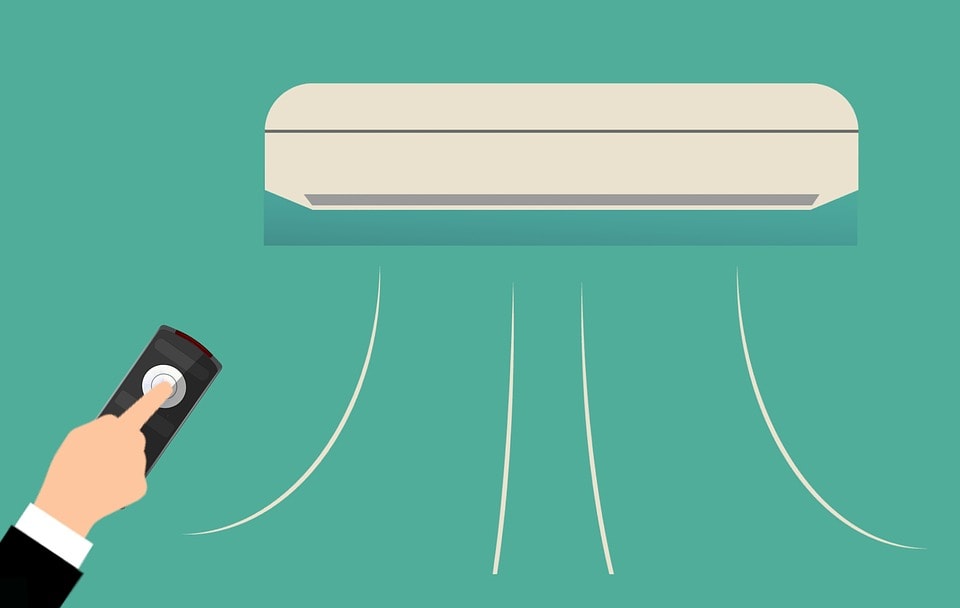
Full of Hot Air?
So your air conditioner isn’t keeping you cool. The first thing to do is to clarify what you mean. Is the unit on and no air is coming out at all? Or is there air coming out but it’s lukewarm or hot?
If there’s no air coming out at all, it may mean one of a few things. It could mean you have your thermostat set incorrectly, or to the wrong mode. It could mean your air filters are past their usable lifetime and need to be replaced. It might also mean a power problem.
If the air coming out of the unit is warm, you may need to adjust your thermostat settings, check your filter, or make sure your outside AC unit is working properly.
To properly troubleshoot the problem let’s take a look at each of these problems individually.
Thermostat Issues
The thermostat is the first place you should always check when your AC isn’t working. Some of the simplest solutions to AC problems happen right in the thermostat unit.
One common problem is having the unit set to the wrong temperature. If the thermostat isn’t set at least 5 degrees below room temperature, the AC unit won’t engage at all.
Another common issue is bumping the settings. Make sure the thermostat is actually on the “cool” function instead of heat. And of course, make sure it didn’t accidentally get turned off!
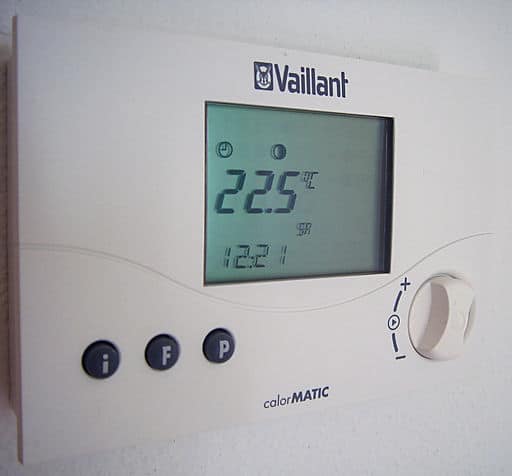
If you have the thermostat set to the “auto” feature you may discover that it sometimes blows room temperature air as part of the auto cycle. Switch it to “on” instead of auto and you should get cold air again.
If you’re looking at the thermostat and it’s displaying nothing at all, you can carefully remove the faceplate. Some thermostats have batteries and others are wired directly into the power lines. If it has batteries, change them. If it’s wired directly in it may be time to call a professional to identify the problem.
Checking the wiring in the thermostat can be done by DIY-repairmen with some electrical knowledge, but be careful!
Blocked or Bad Vents
If you’re getting only a little bit of air, or no air at all, it may be best to look at your vents. The easiest thing to check is to make sure all your vents are open. It’s not uncommon to close a vent and forget about it. While you’re checking make sure they’re not clogged with any dirt or debris.
If the vents look clear, the next best thing to do is to check your air filter. Air filters should be changed every 3-4 months (more if you have shedding pets or a larger household, or sometimes less if you live alone and there’s not much contamination). So if it’s been a while this could very well be the issue. A dirty air filter can cause a blockage of the entire system. This could be the cause if no air whatsoever comes through the vents.
If this doesn’t seem to solve the problem, it may be time to call a tech. You may need to have the entire vent system cleaned and checked. If poor airflow has always been a problem in your system, the problem may actually be related to having undersized ductwork installed. This is unfortunate, but it happens. A professional will be able to spot and offer solutions in this case.
A step beyond just not getting cool air is having your AC system freeze over completely. If you see ice on your AC unit, take a look at our other article to fix that problem!
Is The Unit Getting Juice?
If you suspect the unit isn’t getting power at all check the various service switches. There should be an on/off switch on the outdoor AC unit, near the compressor. There should be another switch near the air handler (which may be located by your furnace, if you have one). The last place to check is the circuit breakers on your electrical panel.
If you find any of these service switches have been flipped, it may indicate a larger problem with the AC unit. These elements are designed to fail as a safety mechanism. If you turn the unit back on and they flip your circuit breaker again, there’s a big problem. Call a professional to find out why the system may be pulling more electricity than your breaker can handle.
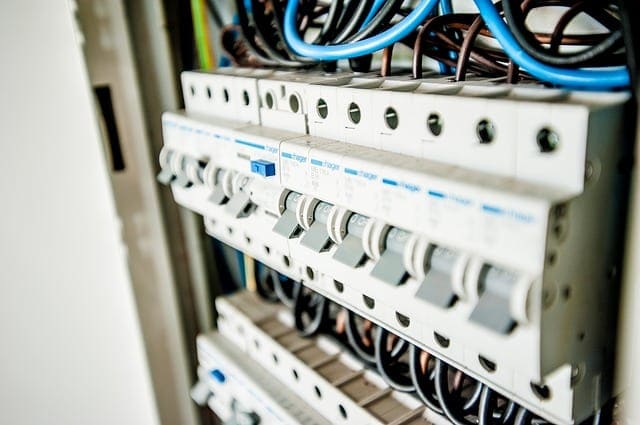
Similarly you may have a water sensor switch that has been shut off. This may be caused by a clogged condensation drain or too much moisture in the nearby area. This is another failsafe meant to prevent flooding and water damage to your home. So again, look at the surrounding area and call a professional if it continues to be a problem!
A Clogged-up Outside Unit
Another cause of warm or hot air being blown through your air conditioning system is a clogged outdoor unit. AC’s pump refrigerant throughout in a cycle that runs from hot to cold, and that hot air needs a place to escape. That is the main function of the outdoor unit.
It is not uncommon, especially in early spring or late summer, for leaves, sticks, dirt, ice, snow, and other debris to block the venting on your outdoor unit. This gives the hot air no means of escaping your AC system. It then takes the next available path – right into your living room.
The Fan
While you’re outside check to see if you hear the outdoor unit’s fan running. If the fan motor has failed, then you’ll run into similar problems as with a clogged outdoor unit.
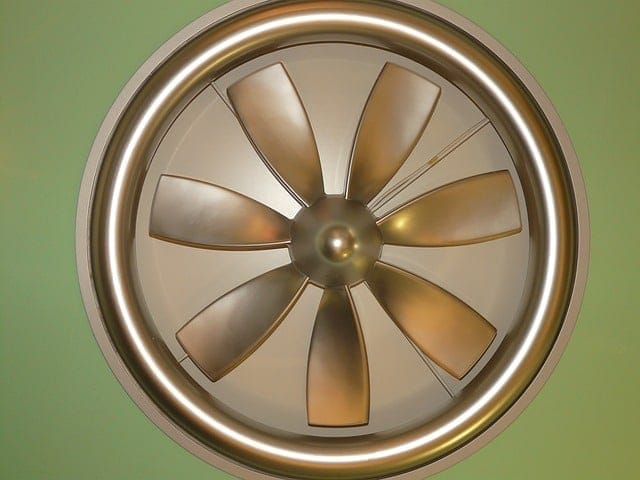
If a fan isn’t working properly you may hear inconsistent noises, tapping, or even scraping in the worst cases. If you’re not getting the usual strong whirr of your compressor fan, then something may be wrong. In serious cases you may even smell burning rubber, in which case the unit should be shut off quickly and a professional called in.
When the fan doesn’t work properly, the heated air put off by the compressor can’t circulate, which leads to unsafe conditions.
The Compressor
The compressor is the workhorse of your AC system. It pumps refrigerant in and out of your AC unit to cool the air in your house and disperse ambient heat. If your compressor isn’t working, it could cause you to get warm or hot air coming through the system.
The compressor is a fine-tuned system. It needs to be working in optimum state for your AC to function properly. Repairs should only be done by licensed professionals, and unfortunately it may be expensive.
If you feel no change in the air around your compressor or it is running extremely hot even after trying the steps we’ve suggested, it is time to call the repairman.
Refrigerant Leaks
The main cause of compressor problems is refrigerant leaks. The way the compressor works is by changing the level of pressure on the refrigerant chemical that runs through it. This engages a thermodynamic effect called the Joule-Thomson effect to cool the air. If the refrigerant is low or has leaked out completely, the compressor can’t work properly and you’ll get warm air.
Refrigerant should always be at a constant level because the compressor is a closed system. If you suspect your refrigerant is low, it means there’s a leak. You’ll need to have a professional both repair and charge the system. “Topping it off” is dangerous and will only cause you further problems down the road
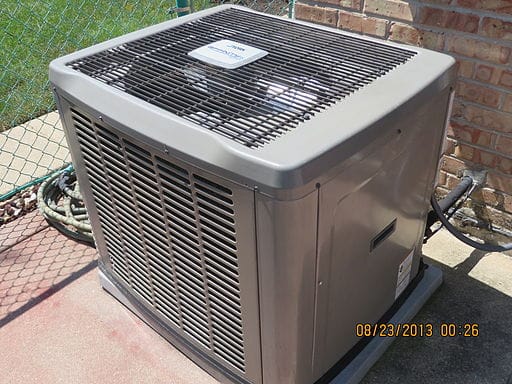
Refrigerant leaks can be hard to detect on your own, and even a small leak can cause huge problems for an AC system.
Such leaks are a very serious matter. Call your professional if you suspect a leak is the culprit. Most refrigerant chemicals can be dangerous to your health and to the environment. HVAC techs undergo extensive training and certification in order to safely handle refrigerant chemicals. So leave things to the experts. Certification is required to purchase the refrigerants used in the systems as well as replace it in your system. A trained and certified HVAC technician will handle the issue quickly, efficiently, and safely.
Summing It Up
So, if you find you’re getting warm air coming through your AC vents, you can take a few steps to see what’s going on.
If there’s no air coming on at all, take a look at your vents, your thermostat, and finally the compressor and AC units themselves. Establish whether it might be a blockage, a filter, or if there’s an electrical problem. If it’s something simple like a blocked vent or a dirty filter, repairing it yourself should be a breeze. With bigger issues like electrical or mechanical problems it’s best to call in the experts.
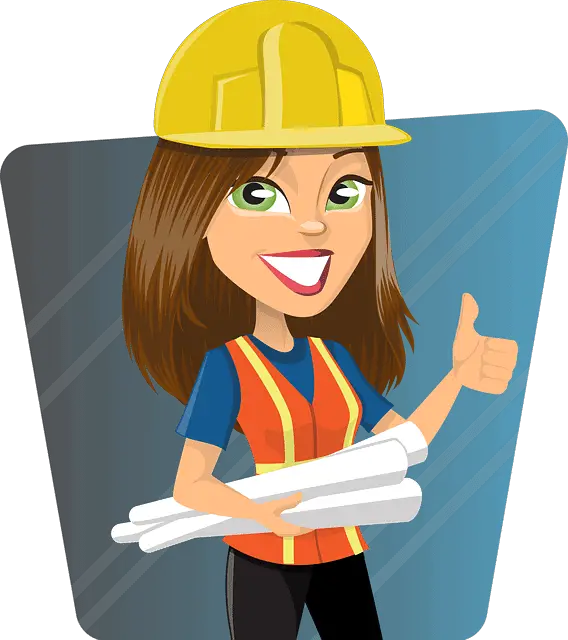
If you’re getting hot air, again it’s good to check the air filter and your thermostat first. Beyond that, make sure your compressor unit is free of debris, and that the fans are working. If you suspect you may have a refrigerant leak or a faulty compressor, call a repairman.
Identifying the cause of your summer hot-air woes shouldn’t be too difficult. But if you feel stumped or didn’t spot the problem, a professional will be happy to find and fix your problem.
Conclusion
Beating the summer heat shouldn’t be hard when you have a good air conditioning system installed. But if that system is having issues, there’s no need to panic. Take a quick look and identify what the problem might be. Most fixes are relatively simple, and when simple fixes fail professionals won’t!
